Beirut's aftermath – shattering as 15 years of civil war
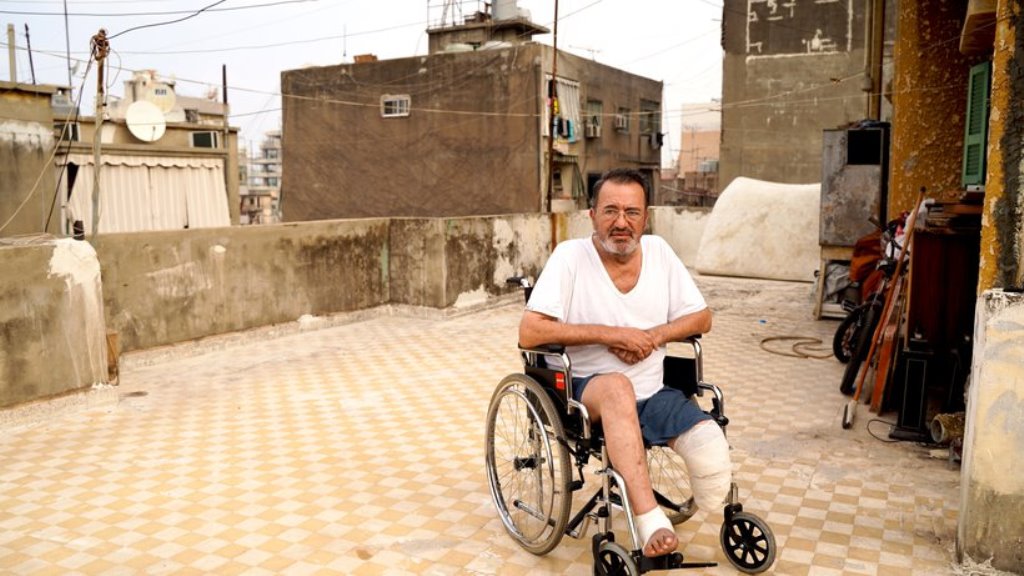
Just a few seconds changed Ayoub Jouni's life forever. Jouni had been a taxi driver for 21 years. When several thousand tons of ammonium nitrate exploded in the port of Beirut, Jouni was driving his taxi through a district of the city directly adjacent to the port. It was about 6 pm on 4 August 2020. All of a sudden, the windows of his car shattered, debris from nearby buildings brought down by the shock wave from the blast perforated the roof, rocks came crashing down on his left leg. Jouni knew immediately that something was terribly wrong. Doctors would later tell him that they had to amputate his leg. When he came home from hospital a week later, his world had changed irrevocably, he says. It had shrunk, shrunk a lot.
Jouni lives with his second wife, Samar, in a flat in Khandaq al-Ghamiq, a poor, predominantly Shia part of Beirut. He can see the port from the roof terrace of the house. Now, however, Jouni is sitting on his bed, trying to find the words to explain what happened to him. He is 63 years of age and wears a white shirt and glasses. He explains that he lost his left leg because of the explosion and later found that he was unable to move his right leg.
While treating his amputated leg, doctors gave him an injection in the wrong place in his back. Ever since, he has been lame in his right leg. He goes on to say that a splinter took the sight in his left eye and relates how, within the blink of an eye, he lost almost all bodily functions. Since the explosion, he has been confined almost entirely to his flat. "Sleep, pray, sleep, pray," he says, summing up his daily routine. His life, says Jouni, ended with the explosion.
The explosion was a massive rupture
It has been three months since the explosion in the port of Beirut. Images of the gigantic mushroom cloud went around the world. One of the reasons the world was so outraged by the blast was that it was an avoidable catastrophe: for years, 2,750 t of ammonium nitrate had been stored without proper safety measures at the port. And the government knew about it. As recently as July, safety experts told both the Lebanese president, Michel Aoun, and the former prime minister, Hassan Diab, how dangerous the situation was and how devastating the consequences of an explosion would be. And still, the highly explosive chemicals were not moved.
Although a number of port workers were arrested after the explosion, no one at the top level of government was held responsible for it. European heads of state expressed their shock and promised to help the people of Lebanon. French President Emmanuel Macron even travelled to Beirut, embraced survivors in front of the cameras and pledged to help the Lebanese people. The EU swiftly provided millions of euros worth of emergency aid.
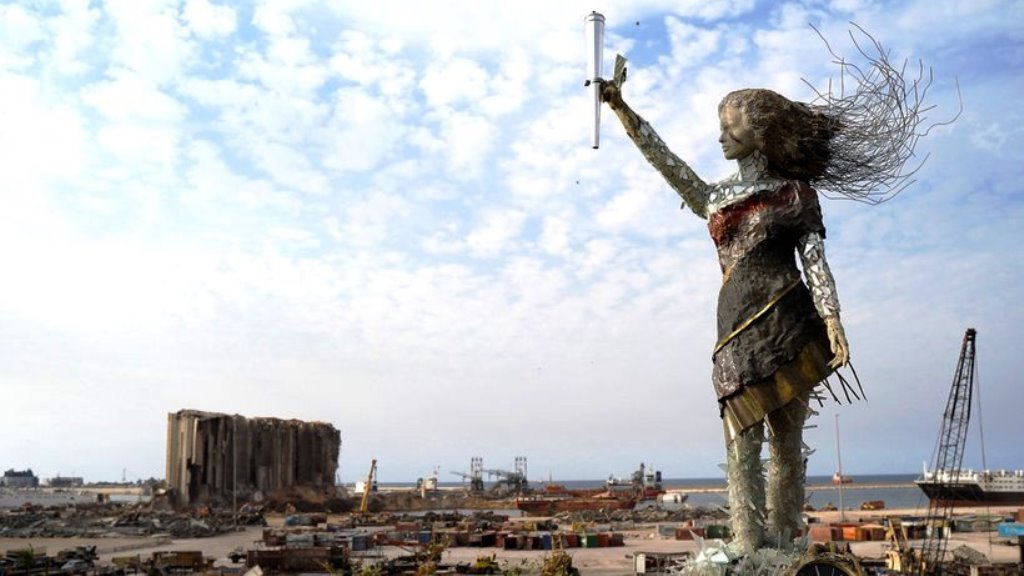
Since then, things have gone very quiet. Yet no other event in recent decades has rocked the country as badly as this. Today, it is very clear that the explosion was a massive rupture.
A total of 191 people lost their lives as a result of the explosion, over 6,500 were injured and about 300,000 were made homeless. Over 70,000 flats in over 9,000 buildings were damaged. The damage in only a fraction of the houses impacted by the blast has been repaired so far. There just isn't enough money for the reconstruction. The World Bank estimates that the damage to buildings and infrastructure runs to between 3.8 and 4.6 billion dollars.
The problem is, however, that Lebanon is broke. Other states and international organisations have stipulated that long-term help will only be given if the government implements a comprehensive package of reform. But Lebanon's political class is not willing to play ball.
An elite that lines its own pockets
As it is, the explosion came at the very worst possible time for the country. Lebanon is currently in the middle of the worst economic and financial crisis of its history; many people have lost their jobs and are teetering on the brink of poverty and the Corona pandemic has only made matters worse. Since October of last year, hundreds of thousands of people have repeatedly taken to the streets, driven by their frustration about their corrupt leaders. They are protesting against an elite that is enriching itself at the expense of the state and whose political actions seek above all to benefit their followers and allies.
Since the civil war ended in 1990, many positions in government have been filled according to a system of proportionality that was intended to ensure that the country's different religious denominations were represented in government. There are 18 officially recognised religious groups in Lebanon. Many Lebanese people see this system as being the root cause of a systematic abuse of power in the country because the leaders of each political grouping attach greater importance to ensuring the backing of their supporters than to the well-being of the people as a whole. No matter how much the situation in the country deteriorates, the political class is not interested in changing the system, because they fear losing their prosperity.
After the explosion, the cabinet resigned. Nevertheless, the likelihood of reforms being introduced now is very low. Just recently, President Aoun appointed former leader Saad Hariri prime minister and asked him to form a government. Hariri spent three years as prime minister before resigning in the wake of last autumn's street protests. Many Lebanese people are sceptical that Hariri is going to be the one to steer the country out of the mire. After all, his policies were one of the things that drove people onto the streets in the first place.
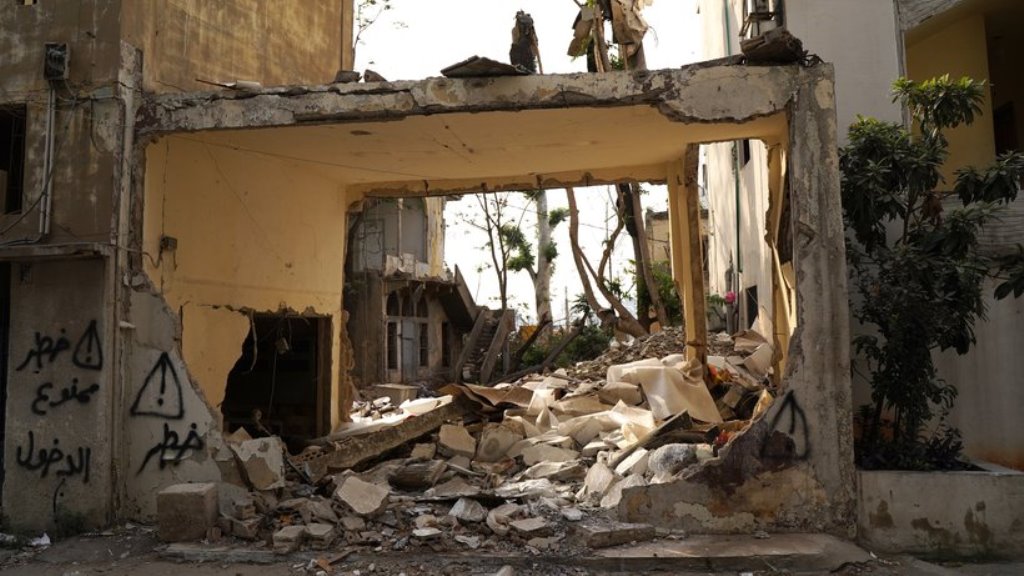
Memories of the Israeli bombs
Multiple crises and explosions have changed Lebanon and its capital, Beirut. There are gaping holes in the walls of many residential buildings, schools and shops where windows once were; parts of some facades have collapsed; many streets are plunged into darkness at night; many houses are empty. Many Lebanese people have left the country. An oppressive silence has descended on those districts previously renowned for their nightlife – where cars with thumping, booming bass used to cruise the streets and young people packed the many bars.
The people of Beirut, once so cheery and upbeat, have become jumpy; many suffer from post-traumatic stress disorder. According to the humanitarian organisation Medecins Sans Frontieres, the number of people needing psychological help has increased significantly in the months since the explosion. Residents say that to them, the explosion felt like an air raid. It brought many of them back to the bombings of the civil war, which raged from 1975 to 1990, and also to the air raids of the war with Israel in 2006.
"The rulers are the real terrorists" – graffiti on a house in Beirut
Lebanon is no stranger to violence and upheaval – caused by political assassination attempts and other events. And yet many Lebanese people say that it has hardly ever been as bad as it is now.
Jouni agrees. He speaks haltingly, stopping repeatedly to cry. When his leg was amputated, he says, the head of the taxi company threw him out, telling him that he was of no use to him anymore. He has been unemployed ever since. He has sold a lot of furniture in order to buy food.
If he wants to get up, Samar lifts him into the wheelchair and pushes him down the corridor to the living room. If he has to go out – for a doctor's appointment, for instance – he either calls on friends to help or Samar offers strangers on the street money to carry Jouni down from the sixth floor. He hates seeing his wife suffer because of him, says Jouni. As far as he is concerned, the politicians are to blame for his predicament. "They are selling their own people to make money," he says.
[embed:render:embedded:node:41129]
You can hear the anger towards the elite all over the city: in taxis, in shops, on the streets. Slogans like "Tear down the system" or "The rulers are the real terrorists" are daubed on walls across the city. Many accuse the government of not only being responsible for the explosion, but also not of giving a damn about the victims.
The fact is that it is both international and local non-governmental organisations and individuals who are powering the reconstruction effort. Right after the explosion, it was volunteers, people from the neighbourhood, family members and friends who cleaned up the streets, cleared away the rubble and looked after the people who had lost everything. The army just stood by and watched.
Three months on, it is still organisations like Live Love Beirut that are replacing windows, delivering meals, supplying medicine and looking after people like Jouni. This Friday, two people from Live Love Beirut brought him a blood sugar monitor; Jouni has diabetes. In recent weeks, they got him insulin and collected money so that he could pay his rent for the next two years. Without the helpers from Live Love Beirut, says Jouni, he would be finished.
The young people want a complete reset
In 2012, Eddie Bitar founded Live Love Beirut with two friends. The organisation's office is a spacious co-working area in a modern building complex just a few streets from where Jouni lives. According to 36-year-old Bitar, his organisation wants to improve people's lives. It organises projects in the fields of environmental protection, education and culture.
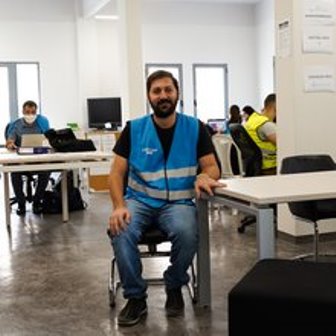
After the explosion, his team put together an emergency committee. No less than 140 people are involved: some are employed, many work for free, most are under the age of 25. Some of them had just graduated from university and were looking for a job; others gave up their jobs to work at Live Love Beirut. "They felt more needed here," says Bitar. Initially, they distributed food, baby food or medicine to those affected by the blast. Then they also launched a reconstruction programme.
"The 30-second explosion caused almost as much destruction as 15 years of civil war," says Bitar. Every month since the blast, over 4,000 people call the organisation asking for help. "The government has abandoned the people," he says. "For 40 years, the same people have been in power and they are not looking after the people." Above all, it is the young people who want to change things, he says. They want a political system with democratic and transparent structures and without corruption and exploitation. This gives him hope.
"Things are really dire now" – Sandra Klat of NGO Bassma
"The politicians have billions and do nothing," says Sandra Klat from the organisation Bassma, which is based in the Beirut district of Badaro. Klat founded Bassma in 2002 with the aim of helping disadvantaged families. Her team distributes food packages, provides training courses and helps people look for jobs. After the explosion, the team spent weeks in the affected districts recording the damage caused by the blast.
Now a group of architects and civil engineers are repairing damaged roofs or facades. Since the port blast, the Bassma team has repaired the homes of about 100 particularly poor people. The work is funded by private donors. "People trust NGOs because they know that the money is going to the needy," says Klat.
Over the years, she says, the situation for many Lebanese people has deteriorated; but the politicians weren't interested. "Things are really dire now." Prices have skyrocketed while the value of the Lebanese pound has plummeted: it's now worth almost nothing. Many people can afford neither food nor medicine, she says. Every day, people in urgent need of help call Bassma. People like Elie Ghayth.
Hoping for help from God
Ghayth lives in one of the poorer Christian districts of Beirut; his house is at the end of a small side street. Ghayth is 61 years of age, a small bald man with glasses. He lives with his brother and two sisters in a two-room flat. Many windows in the house were destroyed. He has done some makeshift repairs, using wooden planks to cover a hole in the wall. Two people from Bassma have come today to measure the window frames so that they can fit new panes. Ghayth is the only one of the siblings with a job; his income is all they have. For 35 years, he says, he has been working for the government, taking home less than €700 a month. He's a jack-of-all-trades, he says, repairing roads and the like. "If they need me, they call me." He is exhausted, he says, adding that he no longer feels safe since the explosion. He has gloomy thoughts; one day merges into the next. How does he manage to carry on? "I pray every day," he replies. "I hope God will help me."
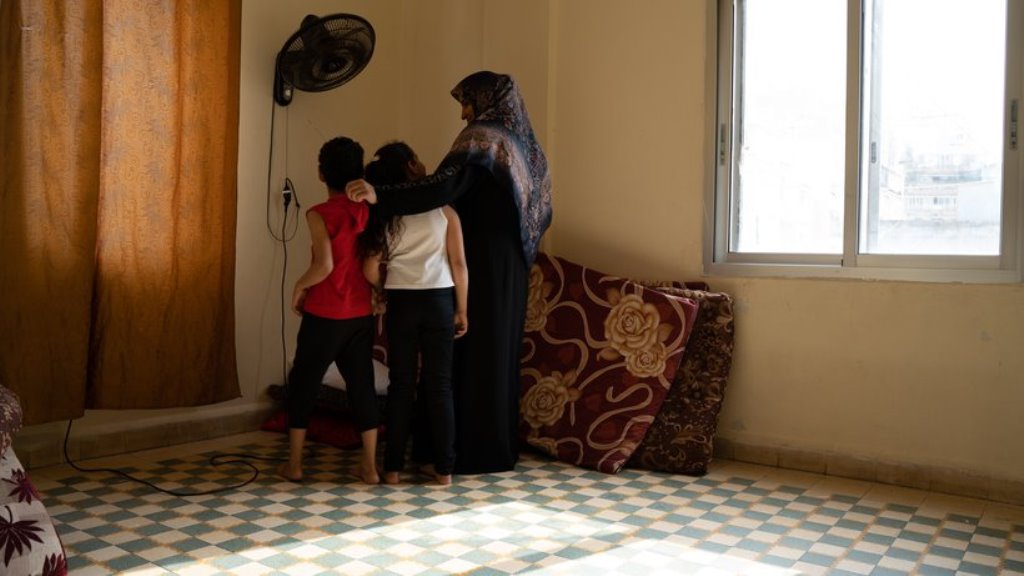
When the two people from Bassma walk down the street after leaving Ghayth's house, they are easily recognisable because of their bright vests with the organisation's logo. Over and over, they are stopped by local residents telling them of damage to their flats, furniture that has been destroyed, broken sanitary facilities.
Salha Khalaf Mohamed approaches the two people from Bassma and asks them to take a look at the damage in her flat. She is 44 years of age and lives with her husband and five children in a flat on the top floor of a corner house. They fled here from Aleppo in Syria in 2013. It has never been easy in Lebanon, she says. He husband got work as a day labourer, but what he earned was barely enough to buy the bare necessities. At the moment, he is out of work.
"We're stuck here"
"The explosion only made everything worse," says Mohamed. The family was in the flat when the blast rocked the city. The shock wave broke the bed frame, the sink and almost every one of the windows. They all still struggle with the consequences, she says. The children are restless and uneasy and can't sleep. Her 16-year-old son has epilepsy. It didn't trouble him for years, but he has started having attacks again since 4 August. He works in a shisha bar and tries to keep going. "The family relies on what he earns," says Mohamed. They fled the war in Syria, she says, to live in safety in Lebanon. "But now we don't feel safe anymore. We don't know where we should go." They can't go back to Syria, but the route to Europe is just too difficult. "We are stuck here."
Jouni knows well how it feels to have no prospects. He says he would like to get out of Lebanon – to Europe more than anywhere else. "But who wants to take in an invalid?" he says. So he hopes he will soon be able to drive taxi again. Maybe his right leg will get better. Sometimes, he says, he forgets that he can't walk any more. When that happens, he tries to put his feet on the floor. But when he then sees the stump where his leg used to be, it hits him like a hammer. Jouni says he would give everything to have his old life back. "Even though it was difficult as it was."
© Qantara.de 2020
Translated from the German by Aingeal Flanagan
You may also like:
Social unrest in Lebanon – Beirut: currency chaos, exploding prices and burning banks
A toxic combination of sectarianism and rentierism – Lebanon's perfect storm
